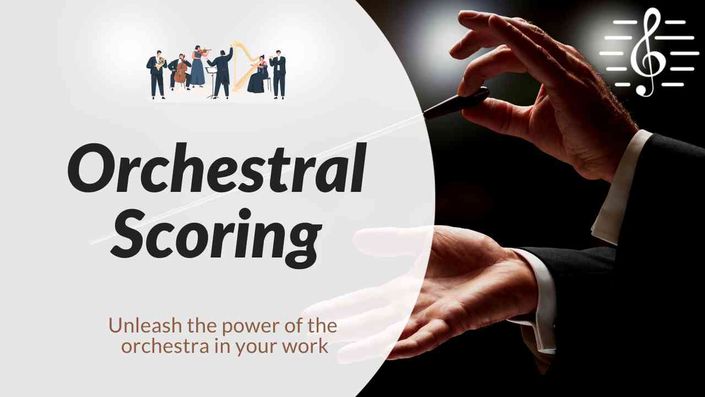

What You Will Learn
Learn how to orchestrate your own music competently with the Orchestral Scoring course.
Learn how to write for orchestra, section by section, covering everything from instrument ranges, to articulation effects, to advice in how best to write for each instrument, and scoring techniques. Each package includes helpful demonstrations of the many different playing techniques as well as how to adapt a simple piano score to a fully orchestrated piece. During the Orchestral Scoring course we'll cover...
- Instrument Ranges - What is the highest and lowest note for each instrument? What can an amateur player achieve compared to a professional? How might you craft a piece to suit the entire range of the orchestra?
- Playing Techniques - How does an instrument achieve it's sound? How do you notate the different techniques in a score? Which techniques suit which styles of writing?
- Timbre and Texture - Where does an instrument produce it's warmest tone? What type of textures are best achieved with a particular orchestraion? What do all the articulations sound like?
- Good Advice - What works well and what are the things to avoid? How should an orchestral score be organised? How do you add and indicate the expressive touches that bring the piece to life?
- Working with a Score - How do you turn a piano piece into a larger orchestral work? How might you use the different instruments within each section? How do you create orchestral contrast and space without having everything playing all the time?
Very enjoyable videos with great instruction. I like the way you don't 'rush' through the subject assuming the viewer has a theory background. Hats off to you sir! Thank you.
- Ed

Who Is This Course For?
Musicians and composers who want to expand their writing skills into the area of orchestration.
Over the course of 32 substantial lessons, you’ll learn all you need to know about each of the family of instruments. Each video is filled with good tips on how to write effectively for each instrument. There follows a detailed look at how best to write for each of the families, individually and collectively, with plenty of practical orchestration tips with an in-depth session following on scoring, in which best practice is explained and illustrated. The course embraces a Piano score of the Music Matters Theme along with an exercise which takes you step by step through how to orchestrate it in various different ways.
Do any of these sound familiar?
"I write orchestral music on a computer but I'm not sure if it's actually playable by real musicians..." "I wish I knew which combinations of orchestral instruments work best together..." "I'm a composer and I'd like to learn to write for the orchestra…" "I'd like to get help on how to improve my writing for orchestral ensembles..." "I would like to learn how to convert a Piano piece to an Orchestral piece…"
↓
Very well written a great course for a generalist study of Orchestration specially suited for Music teachers of String instruments. It gives a working knowledge about this subject.
- Sushil

By the end of the Orchestral Scoring course you'll be able to…

Write effectively for any combination of strings, woodwind and brass

Score music with the playability of real orchestral musicians in mind

Create your own orchestral textures

Take a piano score and score it for any orchestral ensemble

Avoid the common pitfalls composers fall foul of when writing orchestral music

Understand orchestral arrangements, articulations, playing techniques, ranges, clefs and special effects
Enjoyed watching you orchestrate the piece while voicing your considerations for the instruments. Rare to see others do this and useful!
- Aaron

Course Information
What's Included with the Orchestral Scoring Course?
Professional Teaching
You'll receive expert guidance on how to write for the string, woodwind and brass sections of the orchestra.
Practical Examples
Each video teaches you the method for effective orchestration and then follows it by relating it to orchestral mockups of a piece.
Ask Questions
Below each video you are able to post comments and ask questions should you have any in regards to the course topics covered.
Easy to Follow Structure
The course is divided into multiple stages, breaking down each part separately before putting it all together.
Complete at Your Own Pace
You can easily fit the course around your regular commitments, completing it at your own pace and in your own time.
Anywhere Access
Your course never expires. Learn when and where you choose! Computer or mobile. Just get comfortable and dive in!
↓
Your Instructor

Hi, I’m Gareth and I'm passionate about developing ‘the all round musician’.
Over 35 years of music examining with ABRSM, work with the BBC on Radio and TV, experience on the international concert platform, as a published composer and arranger, have brought rich resources to the 40 years of teaching in which I've engaged.
Scholarships at The Royal College of Music, Oxford University and St. Paul’s Cathedral gave me fantastic opportunities to learn from the best musicians, scholars and teachers. Working as Director of Music at Queen Elizabeth Grammar School then provided a wonderful opportunity to develop my teaching skills.
Teaching individuals and groups of all ages, and at all stages of development have refined a teaching approach that I hope is fun and engaging, and focused on explaining things clearly and logically. And that is what these courses are all about - understanding the basic principles with clarity, then going deeper, applying them to your musical life and liberating yourself as a musician.
It’s a rich and amazing journey, and I can’t wait for you to join me today!
Course Curriculum
-
StartLesson 1 - The Violin (9:23)
-
StartLesson 2 - The Viola (9:10)
-
PreviewLesson 3 - The Cello (7:44)
-
StartLesson 4 - The Double Bass (6:25)
-
StartLesson 5 - The Harp (10:05)
-
StartLesson 6 - Writing for Strings (24:26)
-
StartLesson 7 - Scoring for Strings (25:37)
-
StartLesson 8 - Articulation Effects (11:29)
-
StartLesson 1 - Introducing the Woodwind Family (27:41)
-
StartLesson 2 - The Flute (7:06)
-
StartLesson 3 - The Piccolo (6:01)
-
StartLesson 4 - The Alto Flute (4:17)
-
StartLesson 5 - The Bass Flute (3:07)
-
PreviewLesson 6 - The Oboe (7:14)
-
StartLesson 7 - The Cor Anglais (3:48)
-
StartLesson 8 - The Clarinet (8:47)
-
StartLesson 9 - The Bass Clarinet (3:39)
-
StartLesson 10 - The Contrabass Clarinet (4:03)
-
StartLesson 11 - Other Clarinets (5:35)
-
StartLesson 12 - The Bassoon (5:08)
-
StartLesson 13 - The Contrabassoon (3:53)
-
StartLesson 14 - The Saxophone (6:27)
-
StartLesson 15 - Scoring for Woodwind (16:22)
-
StartLesson 16 - Articulations (10:35)
-
StartLesson 17 - Working With The Music Matters Theme (16:11)
Frequently Asked Questions
A Letter from Gareth Green
MA (Oxon), MA (Leeds), FRCO(CHM), FLCM, ARCM
Orchestration can seem like an overwhelming task but, like anything else, once that task is broken down it immediately becomes manageable. Furthermore it quickly becomes a really exciting and engaging activity. Just as a painter has the full spectrum of colours with which to work, so the orchestrator has the full spectrum of orchestral colour to transform fundamental musical ideas into a really vivid score.
The focus of this course is on writing for strings, woodwind and brass, the fundamental core groups that forms the basis of the orchestra. If you play a string, woodwind or brass instrument you have an advantageous start but if you’re not, then by following this course you will soon be up to speed on everything you need to know.
Imagine being able to transform your musical ideas by scoring for Orchestra. This is one of the most exciting musical pursuits. So let’s get started!
— Gareth Green, Music Matters




